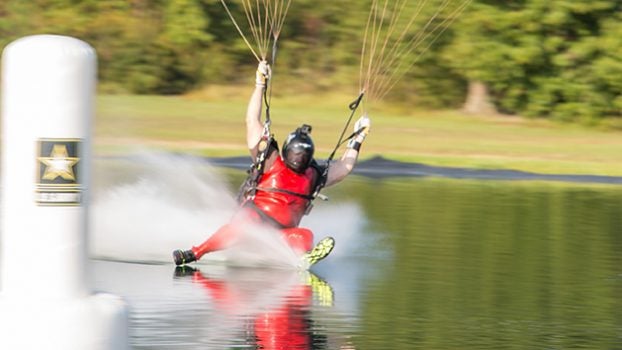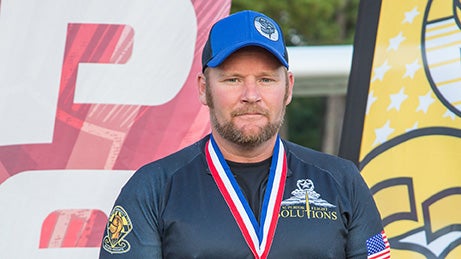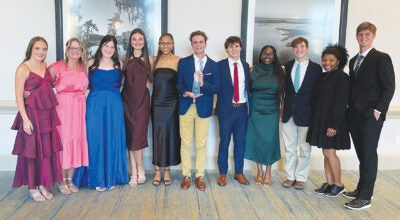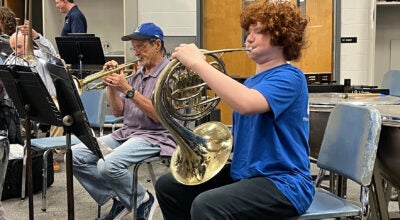Ole Brook grad flies without wings
Published 10:00 pm Tuesday, October 3, 2017
An Ole Brook grad will hurl through the air from 13,000 feet today, swooping as close to the earth as possible at speeds not legal by car.
Then it’s pack, fly, repeat.
Greg Windmiller, 45, is a combat veteran and owner of Superior Flight Solutions LLC, based out of North Carolina, which allows him to teach, coach, train and mentor in several skydiving disciplines.
Today, the 1990 BHS Panther is training Army special operations units how to swoop into areas undetected. With swooping — called canopy piloting — skydivers fly high-performance parachutes that can generate high vertical and horizontal speeds. Windmiller can glide inches above the ground for hundreds of yards at speeds of 90 mph.
Rather than freefall, canopy pilots open their shoots immediately after leaving the plane and can fly 15 to 20 miles under canopy without being heard.
“You’ll never hear them coming,” he said.
Windmiller is one of the best at what he does.
So much so that he recently earned a spot on the U.S. Parachute Team that will compete in the 2018 World Parachuting Championships in Poland. He earned his place on the team by winning the overall canopy piloting bronze medal, as well as bronze in the distance event, at the 2017 U.S. Parachute Association National Parachuting Championships at Skydive Paraclete XP in Raeford, North Carolina, in September.
The canopy piloting championships include competitions in speed, in which pilots try to fly as quickly as possible through a course; distance, which involves flying as far as possible across the ground; and accuracy, in which canopy pilots must stop on an exact spot for maximum points.
Windmiller has completed more than 15,000 skydives.
His first was soon after graduating from Brookhaven.
His family moved to West Lincoln when he was in his mid-teens because his father wanted to be closer to his parents. His siblings — Johnathan, Robbie and Jessica — attended school at West Lincoln, but Windmiller wanted to play football. To do that in the late ‘80s, a student had to go to Brookhaven. He commuted with his best friend Matt every day so he could play.
Following in his father’s footsteps, Windmiller joined the Army his senior year. He graduated in May and two months later he headed for basic training. He rode the bus from Brookhaven to Jackson and another bus to Fort Benning, Georgia.
“The first time I’d ever ridden in an airplane, I jumped out of it,” he said.
He admits it was a “little terrifying” at first.
“The first couple of times, I closed my eyes,” he said.
After infantry training, he attended Basic Airborne School and was assigned to Long Range Surveillance Detachment in Korea. Upon returning to the United States, he was assigned to the 82nd Airborne Division’s Long Range Surveillance Detachment, a unit that specialized in small group infiltration tactics while working in six-man teams conducting reconnaissance and surveillance operations. Windmiller got his start in skydiving by attending the Special Forces Military Free Fall School at Ft. Bragg, North Carolina, and later attending the Military Free Fall Jumpmaster Course. He was later selected to be an instructor at the Long Range Surveillance Leaders Course in Ft. Benning, Georgia. While assigned there he also participated as a member of the “Silver Wings,” Ft. Benning’s Command Exhibition Parachute Team.
Windmiller attended the U.S. Army Parachute Team’s Assessment and Selection in 2000 and was selected as a Golden Knight along with eight others out of 29 participants. He started as a competitor and then team leader of the Style and Accuracy Team and later moved to the Tandem Team as the assistant team leader for several years before co-founding the Canopy Piloting Team in 2007.
In 2008, the first full year of competing in canopy piloting for the Golden Knights, the team saw much success as Windmiller finished the year ranked third in the world at the World Championships in Johannesburg, South Africa, and setting the first of five world records in speed entering the course at nearly 90 miles per hour.
“You can’t represent the Army and the US and go into an event and do it badly,” he said. “We knew if we were going to do it, we had to excel.”
Since 1996, Windmiller has been teaching skydiving and coaching canopy control. He developed his unique teaching style and techniques and began coaching professionally in 2007 as a weekend side job. He has worked with numerous special operations units while assigned to the Golden Knights as part of his duties.
He retired last year but continued his work as a civilian with his own company, Superior Flight Solutions.
This next competition will be his 12th world-level event.
For this discipline of skydiving, he must master speed, distance and accuracy.
“To do well in one event is good, but you need to do well in all three events to be ranked overall,” he said.
It’s an exhilarating sport that can come with injuries and he’s had a few. He broke his arm and tore his rotator cuff in 2014, four days before the U.S. Nationals. He still competed and came in third out of 77 competitors.







